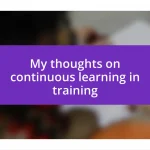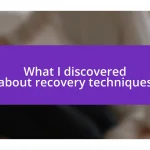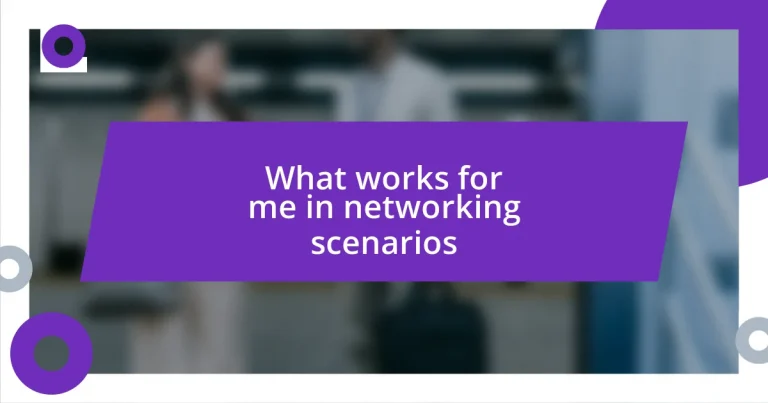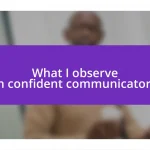Key takeaways:
- Networking fosters relationships that can lead to unexpected career opportunities and provide support during professional challenges.
- Setting clear short-term and long-term networking goals enhances engagement and aligns efforts with evolving professional aspirations.
- Maintaining connections through follow-ups and sharing relevant resources deepens relationships and can lead to collaborative opportunities.
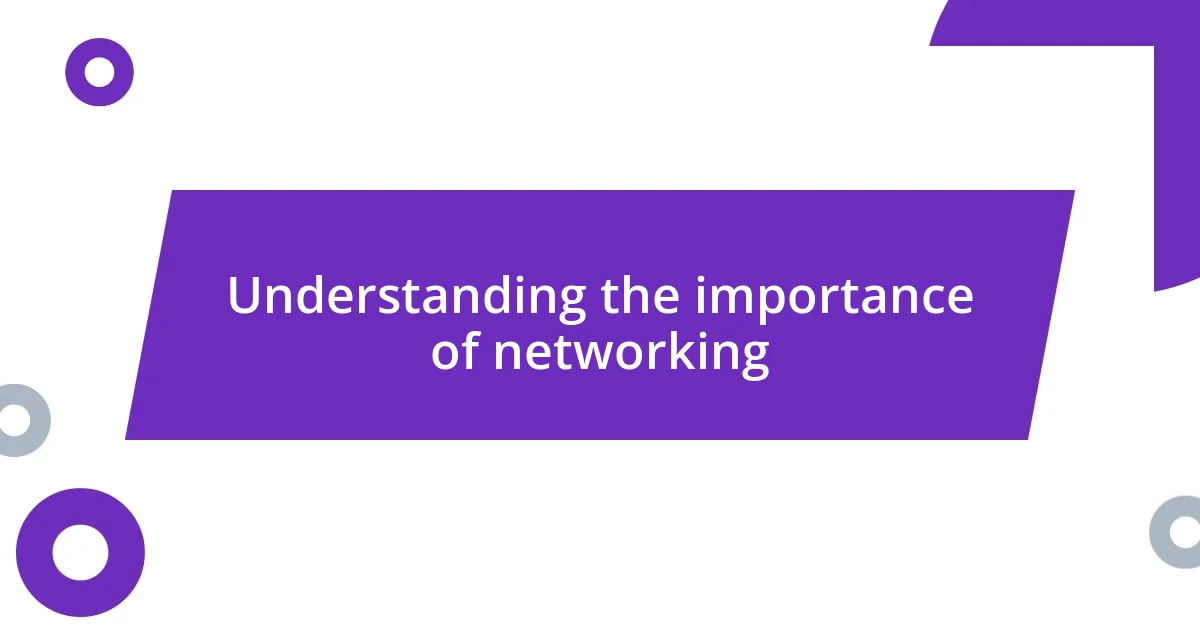
Understanding the importance of networking
Networking is often the bridge that connects individuals to opportunities they never knew existed. I still vividly remember the moment at a local event when a casual conversation led to my first big client. That night, it struck me: relationships can spark unexpected paths in our careers.
The importance of networking goes beyond just professional gains; it’s about building a community of support. I’ve found that every connection has the potential to inspire, challenge, or educate us. Have you ever reconsidered a big decision because of the input from someone in your network? For me, it has happened repeatedly, reminding me just how invaluable these relationships can be.
Networking also helps in creating a safety net during professional storms. There were times when I felt lost in my career, but reaching out to my network provided clarity and direction. There’s a sense of relief that comes from knowing you’re not alone on this journey—something that can be incredibly comforting.
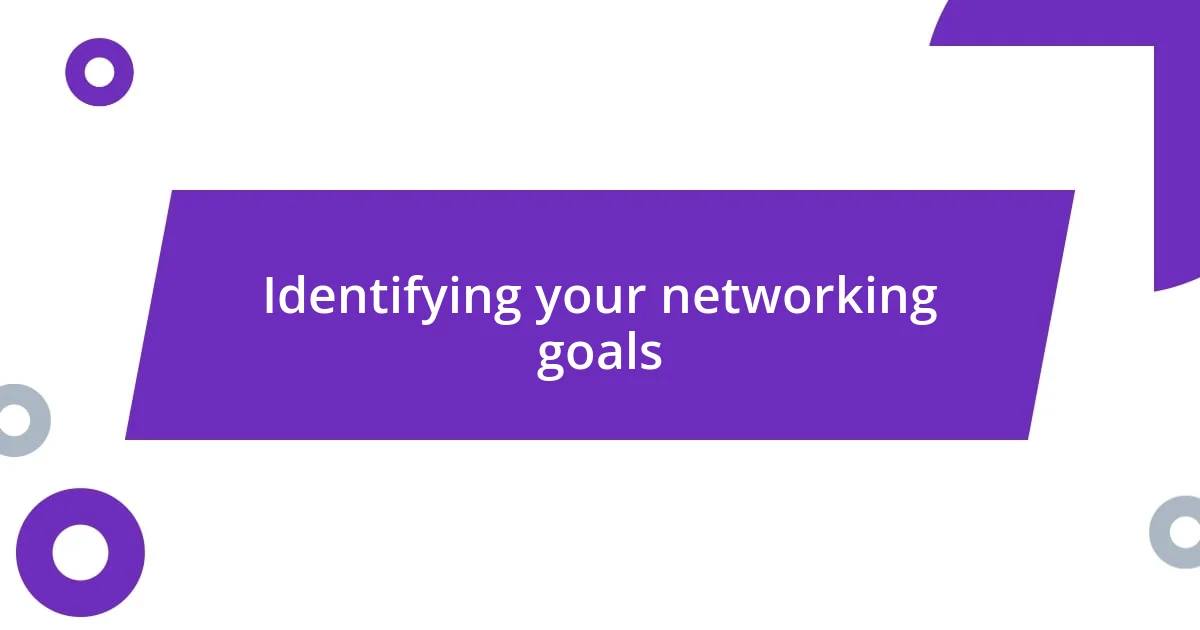
Identifying your networking goals
When I think about setting networking goals, I reflect on the specific outcomes I hope to achieve. It can be as simple as wanting to find a mentor who can guide me through complex career decisions or aiming to connect with peers in my industry to exchange ideas. What I’ve learned is that clarity in my objectives gives my networking efforts direction. It’s much easier to engage in conversations when I know what I’m looking for.
I also consider short-term versus long-term goals. A recent experience reminded me of this dual approach. Last year, I set a short-term goal to attend a series of workshops, intending to meet others in my field. Those initial interactions laid the groundwork for lasting relationships that turned into collaborations months later. In my experience, having both types of goals ensures that I remain open to new opportunities while still working towards my overarching aspirations.
It’s essential to revisit and adjust these networking goals periodically. Sometimes, what I thought mattered most at one stage of my career shifted as I grew and learned. For instance, early on, I sought immediate job opportunities, but now my focus has broadened to include enriching my skill set and enhancing my visibility in my industry. This adaptability keeps me engaged and aligns with my evolving journey.
| Networking Goal Type | Description |
|---|---|
| Short-term | Immediate objectives, like attending events or connecting with individuals for specific opportunities. |
| Long-term | Overall aspirations, such as building a mentorship relationship or establishing a wide professional network. |

Building your personal brand
Building your personal brand is essential in today’s interconnected world. I’ve learned that how you present yourself—both online and offline—shapes how others perceive you. For instance, during a recent conference, I paid close attention to my social media presence and made sure it reflected my professional values. It was a game changer; people approached me for collaborations simply because they resonated with my brand’s authenticity.
To effectively build your personal brand, consider these key points:
- Consistent messaging: Ensure your online profiles mirror your real-life persona.
- Engage your audience: Regularly share insights and experiences that reflect your expertise.
- Authenticity: Be genuine; people connect better when they can relate to the real you.
- Visual identity: Use consistent logos, colors, and graphics across your platforms.
- Storytelling: Share your journey and lessons learned to create emotional connections.
Every time I share a story about overcoming a challenge, I see how it resonates with others—it’s a powerful way to build trust. By nurturing your personal brand, you attract the right opportunities and connections that align with your values and aspirations.
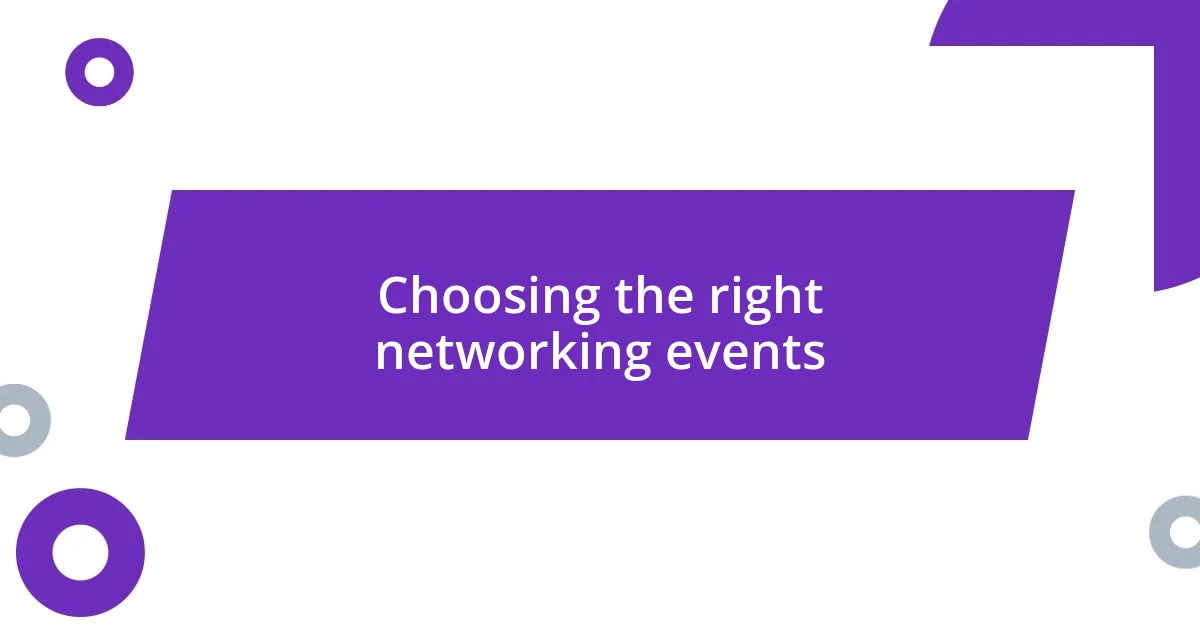
Choosing the right networking events
Choosing the right networking events can truly make a difference in your efforts. I remember attending a large industry conference once, and while the scale was impressive, I found it overwhelming and less impactful than I’d hoped. I quickly realized that smaller, more targeted events often foster deeper connections. Have you ever walked away from a bustling event feeling more lost than inspired? I have, and it’s taught me to prioritize quality over quantity.
When assessing potential networking events, I always check their focus and the types of attendees. For instance, I once joined a local meet-up centered around tech innovations, and it attracted a diverse group of thinkers. The conversations were rich and engaging, leaving me with insights that spurred new ideas in my own projects. I learned that the right event doesn’t just align with my industry; it resonates with my interests and goals.
Another key element is the timing of the event. I’ve found that attending events aligned with specific industry trends or conferences related to my work can yield fruitful results. For example, shortly after a major product launch, I attended an event where many like-minded professionals gathered, resulting in dynamic discussions that expanded our networks. It made me realize that timing can turn a simple event into a goldmine of opportunities. How do you navigate the event calendar to ensure you’re in the right place at the right time? Learning to tap into these moments is a skill that’s certainly worth cultivating.
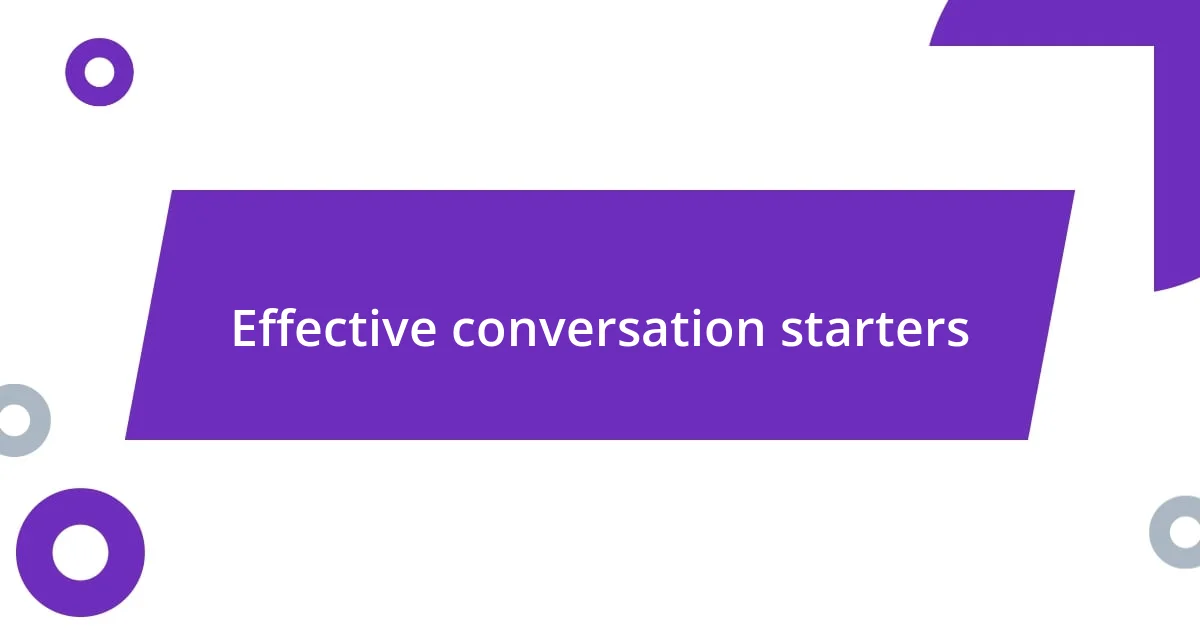
Effective conversation starters
When initiating conversations, I’ve found that asking open-ended questions often leads to the most engaging discussions. For instance, instead of the usual “What do you do?” I prefer to ask, “What inspired you to pursue your field?” This question not only reveals their passion but often leads to deeper topics that allow us to connect on a more personal level.
I remember a networking event where I approached someone and asked, “What’s been the most interesting project you’ve worked on recently?” The conversation flowed effortlessly, and we discovered shared interests in our work. It’s fascinating how a simple tweak in your approach can turn a mundane exchange into an insightful dialogue. Have you noticed how people light up when discussing something they truly love? I have, and it’s those moments that create memorable connections.
Humor can also serve as a great conversation starter. I often use a lighthearted comment related to the event location or the food on offer. Just the other day, at a conference, I jokingly remarked about the overly caffeinated coffee at breakfast. This led to laughter and a chain reaction of anecdotes about similar conference experiences. It reminded me how humor can break the ice and pave the way for more in-depth conversations. What’s your go-to strategy for lightening the mood in networking situations?
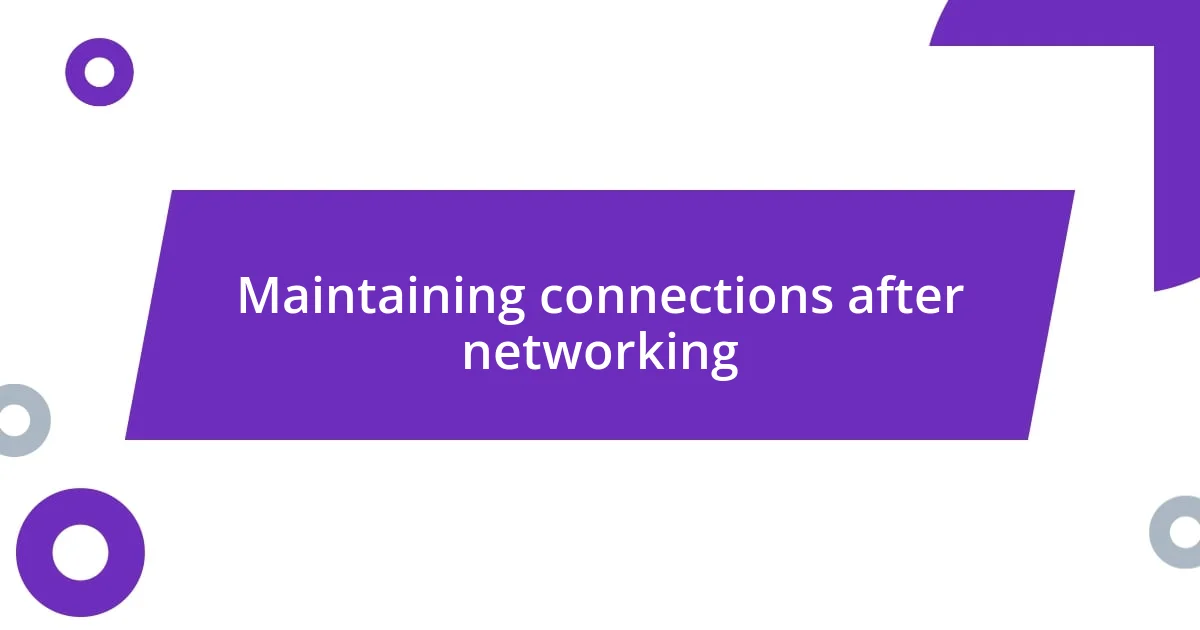
Maintaining connections after networking
One of the most effective ways I’ve found to maintain connections after networking is through timely follow-ups. I often send a simple email or message thanking them for the conversation, which not only shows gratitude but also keeps the relationship alive. Have you ever noticed how a small gesture like this can create a lasting impression? It certainly has for me.
I like to share interesting articles or resources that align with the topics we discussed, reinforcing our connection. For instance, after meeting someone at a marketing event, I stumbled upon a podcast that mirrored their insights on digital strategy. I quickly shot them a message with the link, plus my thoughts. Their response was overwhelmingly positive, leading to a long, enriching discussion. It’s amazing how these shared experiences can deepen a connection, making it more meaningful over time.
Additionally, I believe in the power of checking in periodically, even if it’s just a quick text or social media interaction. Last summer, I reached out to a colleague I met at a workshop, just to ask how their recent project was going. That simple inquiry reignited our conversation and led to brainstorming ideas together! Maintaining connections isn’t just about immediate follow-up; it’s about nurturing those relationships into something impactful and lasting. What approach do you take to keep in touch with your network?
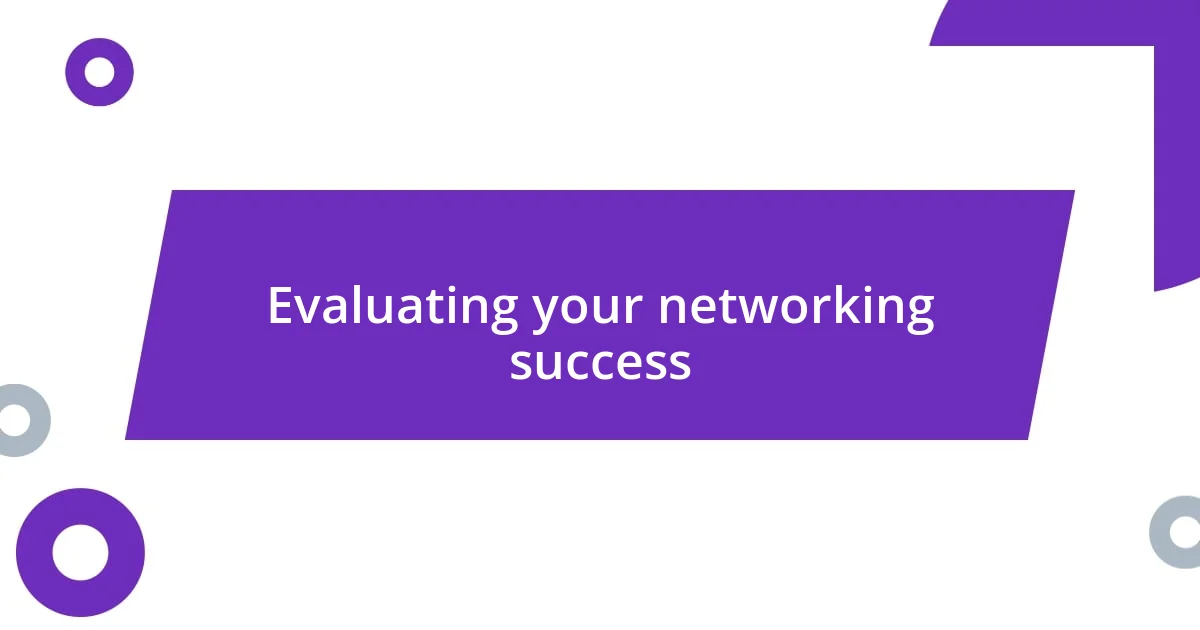
Evaluating your networking success
Evaluating your networking success can be quite enlightening. For me, it involves reflecting on the quality of my connections rather than just the quantity. Have you ever left an event and thought, “Did I really connect with anyone?” I’ve found that focusing on meaningful interactions—those that spark genuine interest and collaboration—gives me a much clearer picture of my success.
I often review my follow-ups and how people responded to them. One time, I reached out to a contact after several months, and they remembered our last conversation vividly. Their detailed recall showed that our earlier interaction had left an impression, confirming that I had indeed built a valuable connection. How do you gauge whether your outreach is resonating with others?
Another aspect I look at is whether these connections lead to new opportunities or collaborations. I once partnered with someone I met at a networking event for a community project, and it was a game-changer for both of us. It’s moments like that that truly highlight the effectiveness of networking for me. Have you experienced any unexpected opportunities stemming from your networking efforts?









